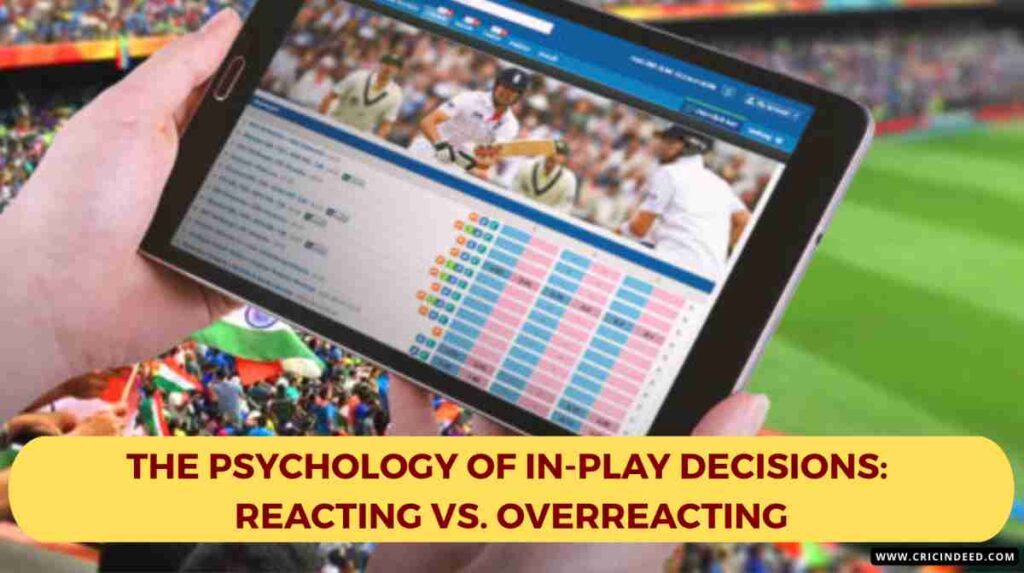Watching a tight T20 clash, your pulse quickens as a new batter arrives at the crease, shifting the game’s momentum in real time.
In that split second, punters—like casual onlookers—must weigh fleeting cues and decide: is it time to jump in, or is your instinct overcooking the moment? Making decisions in live cricket betting isn’t just about luck; it’s a delicate dance between reacting to fresh information and resisting the urge to overreact.
The Split-Second Gambit
Under the glare of floodlights, our brains race. Cognitive psychologists tell us that attention, short-term memory and prioritization collide under pressure, shaping every instant call we make. Ever noticed how a sudden burst of boundaries can send bettors scrambling, even when a team is well behind the required run rate? That frantic pivot stems from anchoring bias—our tendency to latch onto the most recent dramatic event, ignoring the bigger picture. Personally, I find it tricky not to get swept up in the roar of the crowd; it’s almost Pavlovian.
A savvy punter, though, borrows a leaf from athletes: honing focus on key indicators rather than every flourish. Think the captain’s field placements, the commentator’s tone, or a key bowler being brought on to change the flow of the innings. It isn’t rocket science—more like an informal census of what truly matters on TV.
Common Triggers of Overreaction
- Momentum swings: a flurry of wickets does not guarantee a collapse.
- Injury scares: players hobble off, but sometimes they’re back on before you can even process the odds shift.
- Late-game emotions: desperate final-over scenarios breed desperate bets.
I’ve jotted down these triggers in the margin of a matchday program—mostly to remind myself that quick does not always equal clever.
Balancing Gut and Graphs
It’s tempting to lean on gut instinct—after all, it feels human. Yet psychologists argue for a blend of fast intuition (System 1) and measured analysis (System 2). This isn’t about bringing out a slide rule mid-match; it’s about spotting your own knee-jerk. I might blink and think, “That top-order collapse is a gift!”—but then I pause, remember a certain lower-order fightback last season, and hold off.
When I admit my own half-formed whispers of “What if…?” I’m practicing a kind of self-awareness crucial to solid decision-making in live cricket betting. Sure, there’s an art to trusting your sort-of-informed hunch, but it’s equally an art to sit on your hands.
Why Overreacting Bites Back
Overreach too often and you chip away at your confidence—and, frankly, your wallet. While most punters keep a sturdy grip on reality, some may develop problematic patterns. That isn’t meant to alarm; rather, it reminds us that restraint—pausing for just a fraction longer—can be the difference between crisp choices and costly flailings. By layering a quick mental checklist—“Is this real momentum or just stage noise?”—you tip the scales back in your favour, clipping the wings of overreaction.
Understanding current sports betting trends in cricket is also key, as live betting has become a dominant force in the market. Many platforms now offer advanced in-play analytics and ball-by-ball markets, making it easier than ever for bettors to react to every single delivery. This rapid pace, however, makes it all the more important to have a plan and stick to it, rather than getting caught up in the emotional swings of the game.
In the heat of the moment, it always feels as if every heartbeat carries a world of meaning. But sometimes, stepping back, breathing out, and giving your instincts a moment to settle makes all the difference between a shrewd play and an overcooked gamble. As the final ball fades, we’re left sifting through near wins and near misses—proof that nuance lives between the blink-and-you-miss-it swings of any match.
What’s your take? Drop a comment below and share how you guard against overreacting when the odds shift in-play.


